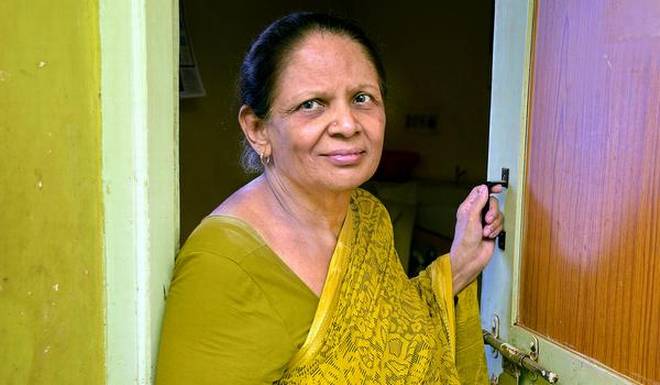Trichy, TAMIL NADU :

A film industry stalwart’s daughter recalls the glory days of Central Talkies in Tiruchi
The glossy reprints on S Rahima’s bed are all that remain of a golden era that once defined her life as the daughter of film producer and theatre owner AM Shahul Hameed. The black-and-white pictures, taken in shooting spots and actors’ homes, hark back to a time when the sheen of show business was cemented by real relationships.
For movie buffs in Tiruchi, Central Talkies on Eda Street, Gandhi Market, once used to be the theatre to catch big banner productions of the day.
Started by Shahul Hameed in 1947, the 22,000 square foot complex opened for business with Payithiyakaran, the Tamil film produced by and starring N S Krishnan, the actor’s first assignment after his acquittal in the Lakshmikanthan murder case.
“My father was already constructing the theatre when he was running his rice business in the 1940s,” says Rahima. “Everything, from equipment to seating, was imported from England.”
Shahul Hameed also marketed films through his company called Central Talkies Distributors.
“He was the sole distributor of the 1958 Hindi film Madhumati in Tamil Nadu (starring Dilip Kumar and Vyjayanthimala Bali). He screened it at a special matinee show for the family in Central Talkies. Madhumati ran for over 100 days in the State, without dubbing,” says Ms Rahima.
Philanthropists
Shahul Hameed was the son of A Mohamed Hussain, a freedom fighter and prominent syrup merchant in Gandhi Market. Interestingly, though partially obscured by encroachments, it is still possible to see a plaque with Hussain named as the benefactor who gifted the Gandhi Market arch to the city of Tiruchi in 1928.

Son Shahul Hameed made his name as a rice merchant, with his Hameedia Rice Mill based in Ariyamangalam. “Like my grandfather, my father was a philanthropist who would readily donate to any worthy public cause,” says Rahima, who is one of seven children born to Shahul Hameed’s second wife.
“He was honoured for his services to the British Government during the Second World War with the title of Khan Bahadur and a gold medal by [the last Viceroy of India] Lord Mountbatten in 1945.”
After Independence, then-Prime Minister Jawaharalal Nehru lauded Shahul Hameed’s generous donation of several truckloads of rice to the Indian troops fighting the Indo-Chinese war in 1962.
Central Talkies also brought the merchant into contact with prominent Indian film personalities.
“Quite early on, my father had gained a reputation as a saviour of films that were stuck in production due to financial problems,” says Rahima. “He helped TR Ramanna to successfully complete the production of Koondukili (1954), and Chinnappa Thevar’s Thaikkupin Tharam (1956), but only as a friendly gesture. Father never indulged in moneylending, because it is against our religious beliefs,” she says.
Becoming a producer
In 1962, Shahul Hameed helped actor-director AP Nagarajan with money to complete the shooting of his directorial debut Vadivukku Valaikappu, starring Sivaji Ganesan, Savitri, VK Ramasamy, MN Rajam and others.
After much persuasion, Shahul Hameed eventually agreed to Nagarajan’s request to produce the film Navarathri in 1964.
“All the stars were signed on for a salary of ₹3 lakhs each,” remembers Rahima. “In those days, you could buy a bungalow for ₹1 lakh in Thillai Nagar.”
A landmark 100th film for Sivaji Ganesan, the movie earned positive reviews for the nine distinct roles essayed by the thespian. It was subsequently remade in Telugu in 1966 with the same title and Akkineni Nageswara Rao in the lead, and in Hindi in 1974 as Naya Din Nayi Raat with Sanjeev Kumar.
Tragedy strikes
The success of Navarathri led to Nagarajan proposing his next film, a mythological, to be produced by Shahul Hameed, in 1965. Originally advertised as Siva-Leela, this was to be later renamed as Thiruvilaiyadal.
“These days, people would probably object to a Muslim producing a Hindu mythological film, but my father never let class or creed affect his friendships,” says Rahima. “He took a personal interest in the film’s production.”
Inspired by the Thiruvilaiyadal Puranam, a collection of 64 Saivite devotional stories written in the 16th century, the film was a critical and commercial success, running for over 25 weeks in theatres.
But it also had a thread of tragedy attached to it, for this was to be Shahul Hameed’s last production.
“A few days after the completion of filming, my father fell sick due to a heart ailment, and passed away on May 20, 1965, at the age of 58. It was as if the light went out of our life immediately,” says Rahima.
Finale
While Thiruvilaiyadal did well, winning awards and setting new standards for Tamil epic films, the lives of Shahul Hameed’s family members were thrown into turmoil.
“My husband Mohamed Kasim had been running the Central Talkies on lease on behalf of my father. Though we initially had a good run, with major films releasing here, my husband was unable to sustain the business due to rising rents,” says Rahima.
Mounting debts forced Shahul Hameed’s heirs to close down Central Talkies in 1983. The complex was sold in 1993.
“The trauma of losing Central Talkies affected my husband’s mental health badly, and he was confined to bed for 18 years,” says Rahima, who nursed him until his death on August 29, 2002.
Living in dire straits in rented accommodation near the Airport, Rahima, now a 70-year-old who suffers from age-related ailments, is supporting an adult son with neurological problems. Protracted property disputes have estranged her from her relatives, says Rahima.
The days of glittering movie premieres are a distant memory. Finding money to pay the bills is a daily challenge for this senior citizen.
source: http://www.thehindu.com / The Hindu / Home> Entertainment> Movies / by Nahla Nainar / August 31st, 2018








